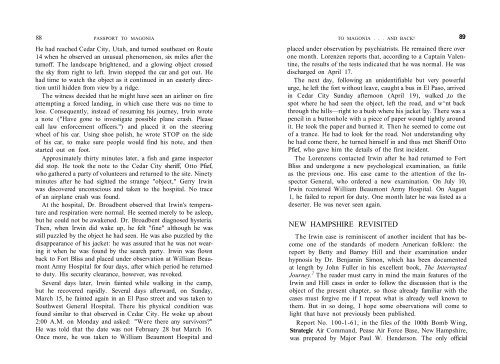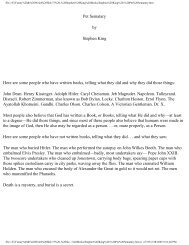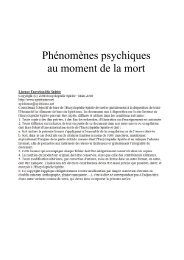Create successful ePaper yourself
Turn your PDF publications into a flip-book with our unique Google optimized e-Paper software.
88 PASSPORT TO MAGONIA<br />
He had reached Cedar City, Utah, and turned southeast on Route<br />
14 when he observed an <strong>unusual</strong> phenomenon, six miles after the<br />
turnoff. The landscape brightened, and a glowing object crossed<br />
the sky from right to left. Irwin stopped the car and got out. He<br />
had time to watch the object as it continued in an easterly direction<br />
until hidden from view by a ridge.<br />
The witness decided that he might have seen an airliner on fire<br />
attempting a forced landing, in which case there was no time to<br />
lose. Consequently, instead of resuming his journey, Irwin wrote<br />
a note ("Have gone to investigate possible plane crash. Please<br />
call law enforcement officers.") and placed it on the steering<br />
wheel of his car. Using shoe polish, he wrote STOP on the side<br />
of his car, to make sure people would find his note, and then<br />
started out on foot.<br />
Approximately thirty minutes later, a fish and game inspector<br />
did stop. He took the note to the Cedar City sheriff, Otto Pfief,<br />
who gathered a party of volunteers and returned to the site. Ninety<br />
minutes after he had sighted the strange "object," Gerry Irwin<br />
was discovered unconscious and taken to the hospital. No trace<br />
of an airplane crash was found.<br />
At the hospital, Dr. Broadbent observed that Irwin's temperature<br />
and respiration were normal. He seemed merely to be asleep,<br />
but he could not be awakened. Dr. Broadbent diagnosed hysteria.<br />
Then, when Irwin did wake up, he felt "fine" although he was<br />
still puzzled by the object he had seen. He was also puzzled by the<br />
disappearance of his jacket: he was assured that he was not wearing<br />
it when he was found by the search party. Irwin was flown<br />
back to Fort Bliss and placed under observation at William Beaumont<br />
Army Hospital for four days, after which period he returned<br />
to duty. His security clearance, however, was revoked.<br />
Several days later, Irwin fainted while walking in the camp,<br />
but he recovered rapidly. Several days afterward, on Sunday,<br />
March 15, he fainted again in an El Paso street and was taken to<br />
Southwest General Hospital. There his physical condition was<br />
found similar to that observed in Cedar City. He woke up about<br />
2:00 A.M. on Monday and asked: "Were there any survivors?"<br />
He was told that the date was not February 28 but March 16.<br />
Once more, he was taken to William Beaumont Hospital and<br />
TO MAGONIA . . . AND BACK! 89<br />
placed under observation by psychiatrists. He remained there over<br />
one month. Lorenzen reports that, according to a Captain Valentine,<br />
the results of the tests indicated that he was normal. He was<br />
discharged on April 17.<br />
The next day, following an unidentifiable but very powerful<br />
urge, he left the fort without leave, caught a bus in El Paso, arrived<br />
in Cedar City Sunday afternoon (April 19), walked ,to the<br />
spot where he had seen the object, left the road, and w^nt back<br />
through the hills—right to a bush where his jacket lay. There was a<br />
pencil in a buttonhole with a piece of paper wound tightly around<br />
it. He took the paper and burned it. Then he seemed to come out<br />
of a trance. He had to look for the road. Not understanding why<br />
he had come there, he turned himself in and thus met Sheriff Otto<br />
Pfief, who gave him the details of the first incident.<br />
The Lorenzens contacted Irwin after he had returned to Fort<br />
Bliss and undergone a new psychological examination, as futile<br />
as the previous one. His case came to the attention of the Inspector<br />
General, who ordered a new examination. On July 10,<br />
Irwin rccntered William Beaumont Army Hospital. On August<br />
1, he failed to report for duty. One month later he was listed as a<br />
deserter. He was never seen again.<br />
NEW HAMPSHIRE REVISITED<br />
The Irwin case is reminiscent of another incident that has become<br />
one of the standards of modern American folklore: the<br />
report by Betty and Barney Hill and their examination under<br />
hypnosis by Dr. Benjamin Simon, which has been documented<br />
at length by John Fuller in his excellent book, The Interrupted<br />
Journey. 2 The reader must carry in mind the main features of the<br />
Irwin and Hill cases in order to follow the discussion that is the<br />
object of the present chapter, so those already familiar with the<br />
cases must forgive me if I repeat what is already well known to<br />
them. But in so doing, I hope some observations will come to<br />
light that have not previously been published.<br />
Report No. 100-1-61, in the files of the 100th Bomb Wing,<br />
Strategic Air Command, Pease Air Force Base, New Hampshire,<br />
was prepared by Major Paul W. Henderson. The only official





